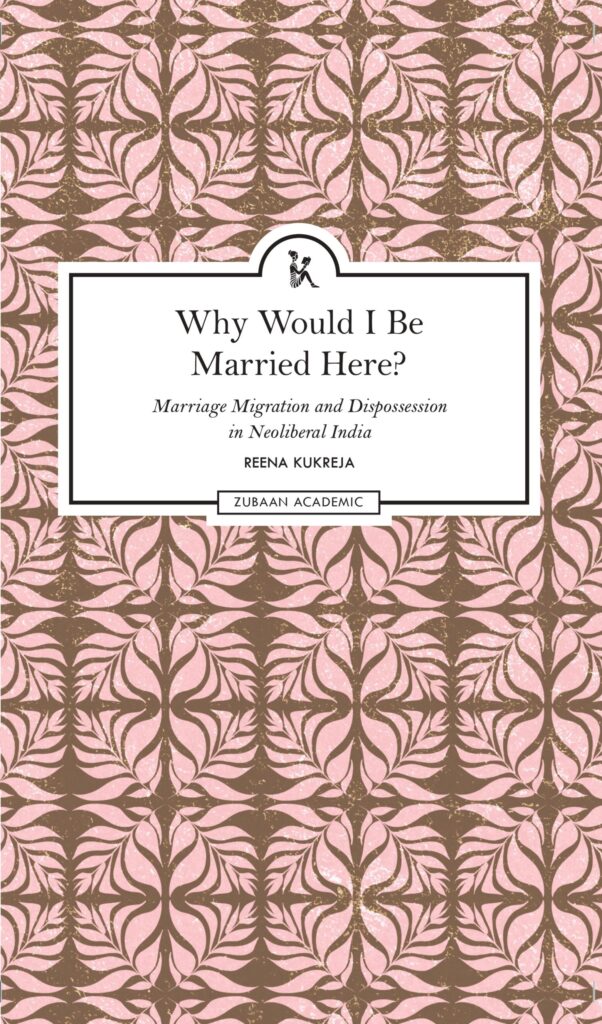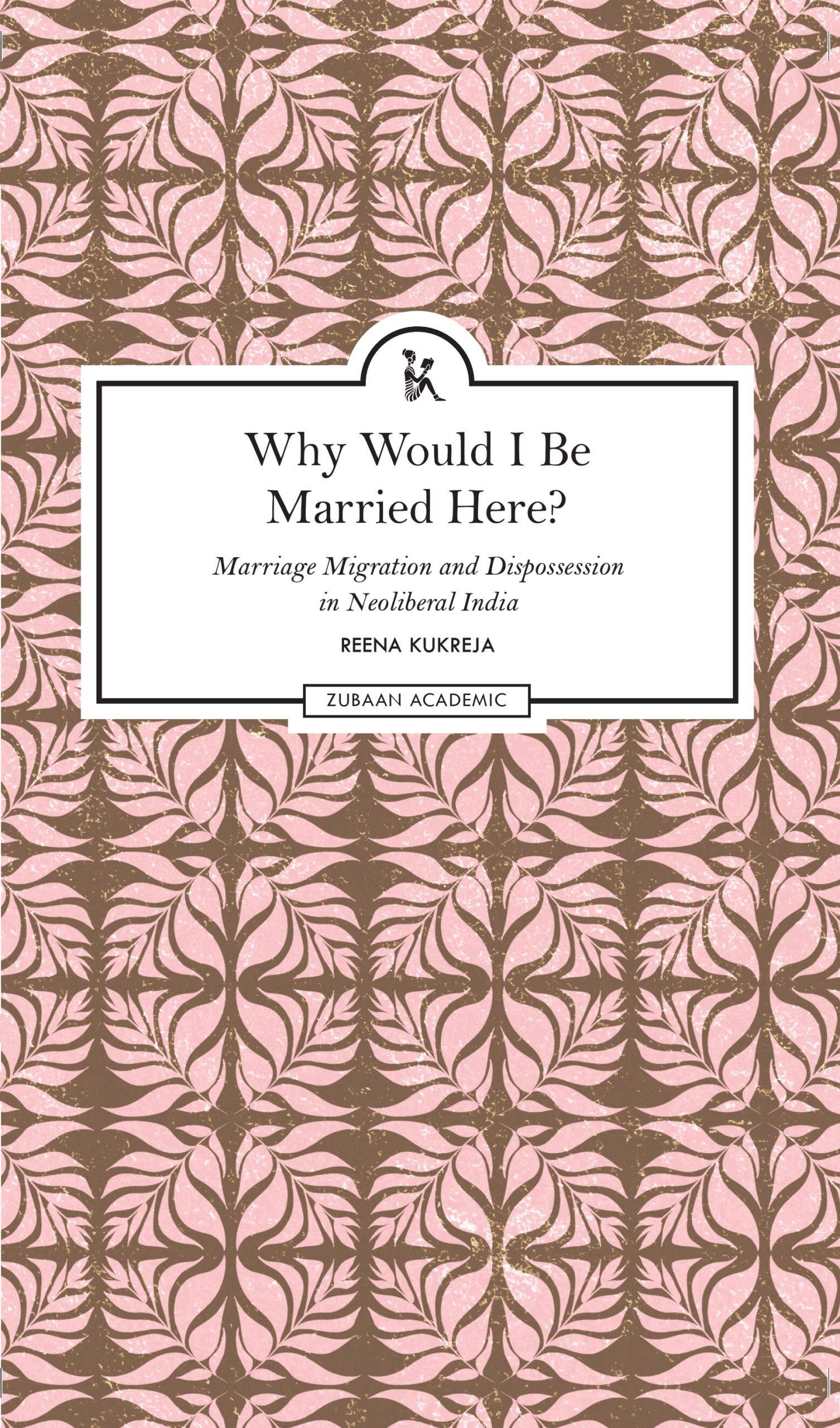
Marriage as an institution has not received adequate attention from the ‘mainstream’ and ‘traditional’ political science. Owing to its relegation to the intimate and private sphere, there is a dearth of scholarly literature that deals with the impact of larger political changes on the institution of marriage as such. It is only with the coming up of feminist scholarship which attempted to question the premises of the discipline (Pateman, 1988) and interrogate the idea of ‘political’ itself (Millett, 2000), that ‘personal’ also came to be counted as ‘political’. Some scholars even argued that marriage has always been a public institution and the history of the nation as a political entity is intertwined with it (Cott, 2000). Reena Kukreja’s book Why Would I Be Married Here? Marriage Migration and Dispossession in Neoliberal India, published by Cornell University Press in 2022 is an important intervention and advance to this long-drawn scholarly conversation. Set in contemporary India, this book attributes the changing marital patterns and marriage migration to macro-level and structural reasons associated with changes in the global political economy.
In the 1990s, India adopted Structural Adjustment Programmes (SAPs) to open and liberalize its economy. While many arguments are made about the alterations such economic reforms have introduced in the larger political processes, an analysis of their impact on personal and everyday intimate lives and choices of people is rarely found. The North Indian state of Haryana started to see many cross-region marriages and ‘incoming’ of culturally alienated, geographically distant, and economically impoverished brides from underdeveloped regions of the country beginning in the same decade. Another Indian state, Rajasthan began to see a similar trend a decade later. Most of these marriages did not follow the traditionally defined and rigorously followed ‘circle of marriage’ in North India.
This book addresses the dominant scholarly arguments on cross-region marriages and gendered marriage migration in India. The first spearheaded by NGOs and human rights organizations looks at such marriages as specific instances of bride trafficking business. The other, however, contextualizes such marriages in widening sex ratio and decreasing availability of women of ‘marriageable’ age. Notwithstanding the importance that these two approaches have as intellectual resources to add to our understanding of these issues, Kukreja argues that both these arguments tend to read too much into the local factors thereby glossing over the global economic patterns and structural reasons which underlie such migration. By using David Harvey’s very useful conceptualization of ‘accumulation by dispossession’, this work emphasizes how neoliberalism seeks to entrench locally by pairing up with and in turn accentuating the existing socio-economic and cultural inequalities (Harvey, 2003). Kukreja looks at the cumulative effect of neoliberal economic realities, caste and regional differences, and gender-based inequalities which produce specific kinds of existential conditions for the cross-region brides in Haryana and Rajasthan.
The book conceives such marriages to be “a new neoliberal avatar of gender subordination and oppression” (p.13). As neoliberal capitalist order makes headways to countries of the Global South including India, it interacts with the pre-existing structures and relations of inequality existing in these regions to produce specific material conditions which is generative of newer forms of exclusions and exploitation. Cross-regional marriage is such an instance where neoliberal realities have pushed at the margins the already struggling groups, particularly lower class and caste groups. In a perpetual state of dispossession, women have also become commodities which can be a trade-off for ensuring one’s survival and sustenance.
This four-year-long study shows how the natal families of cross-region brides belong prominently to the regions targeted by corporate giants. Indian states like Jharkhand, Orissa, and West Bengal are mineral and forest-rich yet the poverty rate and inequality in asset ownership and wealth is very high. This is attributed to the state-mediated neoliberal dispossession in these states to cater to the growing industrial and service sectors (Levien, 2018). Most marginalized communities here, particularly Dalits, Adivasis, and Muslims are robbed of whatever little land or possession they have, thereby further accentuating their suffering. It is predominantly from these families that women are married off as cross-region brides. Their inability to bear wedding expenses and dowry for a suitable groom in their local area along with the money that these grooms from the North give them is an incentive and a survival strategy that fuels such marriages.
Divided into six interesting chapters, the book can serve as a useful methodological guide for social science researchers. Kukreja uses mixed methods to do an extensive and rigorous field study. Added to that is the judicious use of newer forms of intersectional frameworks like Dalit Feminism which provide a thorough lens for looking at caste and gender-based discrimination in South Asia. As the inequalities because of neoliberal exploitation accentuate and the marriage migration continues to get messier, this book should provide reliable theoretical answers to the complicated puzzle of the links between macro-level and micro-level socio-economic and political processes.
References:
Cott, N. F. (2000). Public Vows: A History of Marriage and the Nation. Cambridge: Harvard University Press.
Harvey, D. (2003). Accumulation by Dispossession. In The New Imperialism (pp. 137-182). Oxford: Oxford University Press.
Levien, M. (2018). Dispossession without Development: Land Grabs in Neoliberal India. Oxford University Press.
Millett, K. (2000). Sexual Politics. Urbana: University of Illinois Press.
Pateman, C. (1988). The sexual contract. California: Standford University Press.
***
Khushbu Sharma is a PhD candidate at the Centre for Political Studies (CPS), Jawaharlal Nehru University (JNU), New Delhi. She works on the politics of contested marriages in North India.
